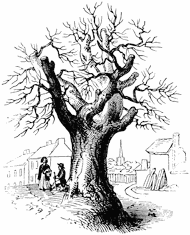With thee I joyne young Juvenall, that byting satyrist that lastly with mee together writ a comedie. Sweet boy, might I advise thee, be advised, and get not many enemies by bitter words : inveigh against vaine men, for thou canst doo it, no man better, no man so well : thou hast a libertie to reproove all, and name none : for one being spoken to, all are offended ; none beeing blamed, no man is injuried.
Stop shallow water still running, it will rage ; tread on a worme and it will turne : then blame not schollers who are vexed with sharpe and bitter lines, if they reproove thy too much liberty of reproofe.
And thou, no less deserving then the other two, in some things rarer, in nothing inferiour, driven, as myselfe, to extreame shifts, a little have I to say to thee ; and were it not an idolatrous oath, I would sweare by sweet S. George, thou art unworthy better hap, sith thou dependest on so meane a stay. Base minded men, all three of you, if by my misery yee bee not warned : for unto none of you (like me) sought those burs to cleave : those puppits (I mean) that speake from our mouths, those Anticks garnisht in our colours. Is it not strange that I, to whome they all have bin beholding ; is it not like that you, to whom they all have bin beholding, shall (were yee in that case that I am now) be both of them at once forsaken? Yes, trust them not ; for there is an upstart crow beautified with our feathers, that with his Tygres heart, wrapt in a players hyde, supposes hee is as well able to bombast out a blank verse as the best of you ; and beeing an absolute Johannes fac totum, is, in his owne conceyt, the onely Shake-scene in a countrey. Oh that I might intreat your rare wittes to bee imployed in more profitable courses, and let these apes imitate your past excellence, and never more acquaynte them with your admyred inventions. I knowe the best husband of you all will never proove an usurer, and the kindest of them all will never proove a kinde nurse ; yet whilst you may, seeke you better maisters ; for it is pitty men of such rare wits should bee subject to the pleasures of such rude groomes.
In this I might insert two more, that both have writte against these buckram gentlemen ; but let their owne work serve to witnesse against theyr owne wickednesse, if they persever to maintaine any more such peasants. For other new commers, I leave them to the mercie of these painted monsters, who (I doubt not) will drive the best minded to despise them ; for the rest, it skils not though they make a jeast at them.
But now returne I again to you three, knowing my miserie is to you no newes ; and let me heartilie intreate you to be warned by my harmes. Delight not, as I have done, in irreligious oaths, for from the blasphemers house a curse shall not depart : Despise drunkennes, which wasteth the wit, and making men all equall unto beasts : Flie lust, as the deathsman of the soule, and defile not the temple of the Holy Ghost. Abhorre those epicures, whose loose life hath made religion loathsome to your eares, and when they sooth you with tearms of mastership, remember Robert Greene, whome they have often so flattered, perishes now for want of comfort. Remember, gentlemen, your lives are like so many light tapers, that are with care delivered to all of you to maintaine ; these with wind-puft wrath may be extinguished, which drunkennesse put / p.145 / out, which negligence let fall ; for mans time of itselfe is not so short, but it is more shortened by sinne. The fire of my light is now at the last snuffe, and the want of wherewith to sustaine it, there is no substance for life to feed on. Trust not then (I beseech yee) left to such weake stayes : for they are as changeable in minde, as in many attires. Well, my hand is tyred, and I am forst to leave where I would beginne ; for a whole booke cannot contain their wrongs, which I am forst to knit up in some few lines of words. Desirous that you should live, though himselfe be dying.
|
